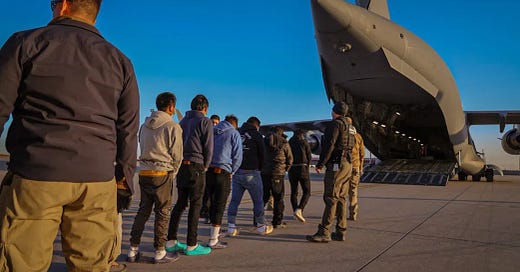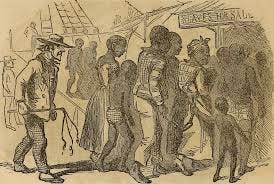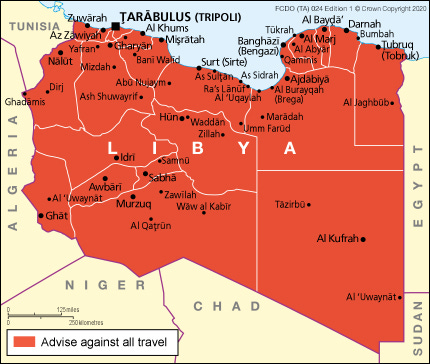Trump's Slave Auction: How the U.S. Revived Human Trafficking as Policy
Secret deals. Military planes. Coerced removals to countries known for slavery. This isn’t immigration enforcement — it’s a crime against humanity.
“To be rendered voiceless is to be made invisible. And the invisible are always the first to be disappeared.”
— Arundhati Roy
“Human trafficking is an open wound on the body of contemporary society…It is a crime against humanity.”
— Pope Francis
The Quiet Revival of a Horror
A man wakes up on a plane. His wrists ache from plastic cuffs. The low drone of engines vibrates through the metal floor. The cabin is dim, military-issue gray. He turns, straining his neck, trying to see something familiar. Faces around him: silent, lost, frightened. No windows. No crew to answer questions. Only the sudden, stomach-turning realization — he has no idea where he's headed.
Imagine waking up like this. Stripped of your phone, your papers, your shoes. Stripped of even knowing what country you’re flying over. You’re in the hands of a power you never chose, heading toward a destination you've never heard of. This isn’t a deportation — this is disappearance. It's kidnapping wrapped in diplomatic doublespeak. It's trafficking.
But trafficking isn’t a word Americans like to apply to ourselves. We prefer softer terms. "Immigration policy." "Border security." "Relocation agreements." Yet here’s the reality we have to face: the United States government is now negotiating with foreign governments to take human beings — without their consent, without informing them where they’re going, and in many cases, to nations with histories of torture, slavery, and trafficking. What do we call that, if not human commerce?
We started laying out this truth in earlier reports. In "Tren de MAGA", we described the machinery designed to remove people, not just from the country but from the public imagination.
In "The Disappearance Was the Point", we revealed how erasure is itself the objective. Now, we bring the receipts.
The Evidence: What We Know So Far
Let’s be precise. According to multiple investigative reports this week, the Trump administration has been negotiating secretive deals with governments in Libya, Rwanda, Saudi Arabia, and others, to accept asylum seekers and migrants removed from the U.S. These are not symbolic gestures. These are financial arrangements to offload human beings.
The Washington Post reported that U.S. officials explored “multiple third-country deals” that would allow deportations of migrants to countries that the United States itself warns are dangerous—even to American travelers. Libya, for example, is currently under a Level 4 “Do Not Travel” advisory from the U.S. State Department due to risks of kidnapping, armed conflict, and arbitrary detention. The same article confirmed that “the Trump administration has continued to pursue such arrangements,” despite warnings from international law experts and internal dissent. These are not safe transfers. These are orchestrated renditions into zones of known danger.
This week, a federal judge issued an emergency order blocking the United States from carrying out these deportations without due process. Judge Murphy ruled that the administration must provide “prior written notice and a meaningful opportunity to raise fear-based claims” before removing migrants to any third country. As of today, the administration has been forced to pause flights to Libya and other destinations. But reports suggest that DHS is still looking for ways to move around the court’s ruling.
The Wall Street Journal adds a layer of duplicity: Libyan officials say they never agreed to take in U.S. so-called “deportees.” That didn’t stop the U.S. from attempting to put people on planes. It just means the final destination might not be disclosed — even to the receiving country. In other words: secret flights, secret deals, and vanishing people. Again, this isn’t a deportation program. This is a trafficking operation.
The pattern is already familiar. In "From Borders to Chains", we traced the transformation of the immigration enforcement regime into something more violent and opaque. What we’re seeing now is the logical next step: a global infrastructure of forced human exchange, with the United States at the center.
What happens to people once they arrive in these third countries? The administration either doesn’t know or doesn’t care. But we do. Libya is known for literal slave markets. Rwanda has been accused of forcibly conscripting arrivals into military labor. Saudi Arabia’s track record on migrant abuse is well documented. Yet these are the nations the U.S. sees as partners.
This is not conjecture. This is public record. This is happening.
And now, finally, a court has stepped in to say: enough. But the administration isn’t backing down. The plan is still alive. The flights are only paused. The deals are still on the table. And unless we name this for what it is — trafficking, not policy — we will miss the moment to stop it.
The Legal Case: This Is Human Trafficking
Under international law, trafficking doesn’t only mean sexual exploitation or smuggling. It means transporting human beings by force, deception, or coercion for the purpose of exploitation. The Palermo Protocol, the gold standard for international anti-trafficking law, defines it this way:
"The recruitment, transportation, transfer, harbouring or receipt of persons, by means of the threat or use of force or other forms of coercion... for the purpose of exploitation" (Article 3, UN Protocol to Prevent, Suppress and Punish Trafficking in Persons, Especially Women and Children).
Now apply that definition to what the U.S. is doing.
Coercion? Check. These are people in custody. People with pending asylum claims. People who were never told where they were going. Some weren’t even given a chance to speak to a lawyer.
Transportation and transfer? Obviously. They’re being put on planes to countries with known human rights violations.
Financial transaction? Yes. These are paid deals. The U.S. is offering compensation or aid packages in exchange for countries agreeing to take deportees.
Exploitation? Here’s where the silence screams. Because no one in the U.S. government has even tried to guarantee safety. These aren’t supervised humanitarian resettlements. These are black-box transfers to countries with documented patterns of labor exploitation, militia conscription, and state abuse.
This is not a legal gray area. It’s not even close. It is human trafficking.
And under U.S. law, specifically the Trafficking Victims Protection Act (TVPA), anyone who knowingly participates in or financially benefits from a trafficking scheme can be held liable — even if they never laid hands on the victim.
So let’s dispense with the euphemisms. These are not deportation logistics. They’re acts of international trafficking by a state actor. A state trafficking regime. Designed. Coordinated. Executed. By officials at the highest levels of the U.S. government.
Who’s Involved: Naming the Network
This scheme didn’t appear out of nowhere. It required structure. It required infrastructure. It required a network.
Start at the top. DHS signed off on these removals. ICE coordinated the operations. DoD provided the planes. And all of it — every quiet arrangement, every bureaucratic pathway — flows from White House policy decisions.
Then there are the contractors. The ones who fly the planes. The ones who operate the detention centers. The ones who write the checks and move the people. If you’ve followed my work, you already know their names. GEO Group. CoreCivic. Logistics firms that specialize in "secure transportation." Private security outfits that hand migrants off on tarmacs with no witness and no trail. These are not neutral service providers. They are active participants.
And finally, the receiving regimes. Libya. Rwanda. Saudi Arabia. El Salvador. Each with its own agenda. Each with its own abuses. Each willing to accept bodies — at a price. When El Salvador takes Venezuelans from the U.S. only to send them back to Venezuela in a separate political negotiation, what are we witnessing, if not the resale of human beings?
This is the supply chain of disappearance. It’s made up of policy architects, bureaucratic technicians, corporate profiteers, and authoritarian buyers.
It’s not broken. It’s functioning exactly as designed.
And it’s time to start naming every link in the chain.
The Historical Echo: A Slave Auction on Global Terms
This isn’t new. It’s just evolved. What we’re seeing now is a technological upgrade to an old horror.
Two hundred years ago, people were kidnapped from Africa and sold into bondage in the Americas. Now, people are fleeing violence in Central America, Africa, the Caribbean — and finding themselves rerouted by the U.S. into countries they didn’t choose, often without even knowing where they are. Not because they broke the law, but because they were deemed inconvenient.
The auction block never disappeared. It got digital. It got diplomatic. But the logic hasn’t changed. Bodies treated as surplus. Human life reduced to logistics. One country pays. Another takes. The product: people.
And who are the bodies in this exchange? Let’s not kid ourselves. These are overwhelmingly Black and brown migrants from the Global South. Poor. Stateless. Already brutalized by war, poverty, or displacement. And then further dehumanized by a system that marks them not as individuals, but as problems to be moved, monetized, and disposed of.
It is racialized. It is imperial. And it is bipartisan.
We’ve been told for years that the cruelty was just a Trump-era glitch. That with a different party in power, things would return to normal. But this is the new normal. Democrats and Republicans alike have funded it, expanded it, and now outsourced it.
In "The Trapdoor Verdict", we examined how systems of justice conceal their cruelty behind the language of law. This is that principle, exported and industrialized. Not a trapdoor. A global chute.
And if we’re not careful, we will get used to it. We will forget what came before. We will stop recognizing that we’ve rebuilt a slave auction — only this time, it’s international, and it’s policy.
The Consequences: Legal, Political, and Moral
Let’s be very clear: this is not just a political scandal. This is potentially criminal conduct.
The International Criminal Court has jurisdiction over crimes committed on the territory of state parties. Libya and Rwanda are both members. If individuals are trafficked there through U.S. operations, that triggers the ICC’s authority. U.S. officials may not be immune.
What’s on the table? Charges for crimes against humanity under Article 7 of the Rome Statute. Specifically: enslavement. Deportation. Persecution. Transfers without consent.
Beyond the ICC, there are mechanisms through the Inter-American Commission on Human Rights, the UN Human Rights Council, and the UN Special Rapporteur on Trafficking in Persons. These bodies can investigate, censure, and apply serious reputational and diplomatic pressure.
Then there’s domestic liability. Under the TVPA, survivors could file lawsuits. Contractors could face criminal exposure. Government officials could be investigated for civil and criminal violations.
And perhaps most dangerously for this administration: insiders could come forward. Whistleblowers could testify. The paperwork exists. The memos exist. Somewhere, a contractor or bureaucrat has the receipts. And once those receipts are public, the dam breaks.
These aren’t just vulnerable migrants. They are witnesses to a global crime in progress.
They are not alone.
And neither are we.
What This Means for Democracy
This isn’t just an immigration issue. This is a test of what kind of country we have become — and what kind of country we’re willing to be.
Because if the United States can pay to disappear people — if it can outsource cruelty, avoid accountability, and repackage forced displacement as diplomacy — then the framework is already built. The precedent is set.
If you can disappear a refugee for cash, you can disappear a citizen for dissent.
A trafficking state is not just one that moves bodies for profit. It is one that turns law into a tool of erasure. It labels life as surplus. It refines the act of coercion into bureaucracy. It launders violence through official channels and calls it order.
And once the state has mastered this technique on immigrants — those with the fewest rights, least visibility, no vote — it does not stop there. It never does.
This is why The Firewall exists. Not just to defend migrants. Not just to document abuses. But to name the authoritarian machinery and build a new resistance network powerful enough to dismantle it.
Because democracy dies behind closed hangar doors. It dies in classified agreements. It dies in each silent, untraceable flight. And the only thing that can stop it is the truth told clearly, loudly, and together.
So let’s tell it.
Call to Action: Break the Silence
We need to make this story impossible to ignore.
If you’re a whistleblower: we see you. You are not alone. We will protect you. We will amplify your voice. Contact us securely. We will help you come forward.
If you’re a lawyer: prepare for litigation. These cases are coming. The facts are falling into place. The violations are real. We need counsel ready to take action — domestically, internationally, across jurisdictions.
If you’re a journalist, an organizer, a professional in any field: now is the time to choose sides. This is the moment to draw the line. We cannot afford to normalize this. We cannot let it become another quiet policy footnote.
Authoritarianism isn’t coming. It’s here. And it’s trafficking people for power.
We draw the line here.
Not in our name.
Not again.











